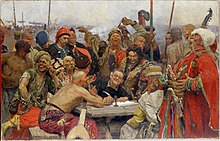Oleksii Sokyrko, Taras Shevchenko National University of Kyiv
In contemporary Ukraine, the history of the Ukrainian Cossacks is an important part of the national culture and identity. Cossack gastronomy has become a hallmark of Ukrainian cuisine – borscht, dumplings (varenyky), salo and horilka. However, initially the formation of the Cossacks was strongly influenced by the East. The very word “Cossack” and ancient Cossack dishes – kulish, salamaha – had a Turkic origin. In fact, the diet of the Cossacks had many features characteristic of the soldiers of the Early Modern period and combined both eastern and western features. But, the gastronomic culture of the the Cossack elite (starshyna (Cossack Officials)) was not much different from the traditions of the nobility of the Polish-Lithuanian Commonwealth — shliakhta, whose culture also had many oriental details. Commercial and military contacts with the Ottoman Empire and the Crimean Khanate brought oriental products and spices to the daily life of the Cossack Hetmanate – coffee, figs, almonds, carob, olives, lemons, date palms, saffron, rice, cinnamon, allspices, various types of pepper. Less known about another article of oriental gastronomic import – sea products: sturgeon, flounder, black caviar and even exotic cuttlefish, which were delivered to the tables of the Cossack nobility by Greek and Turkish merchants. It is very important that, together with the products, the merchants who distributed them also distributed the recipes of dishes, cooking technologies, preservation of products and names.
Oleksii Sokyrko is Associate Professor of the Taras Shevchenko National University of Kyiv. His research interests cover early modern Ukrainian military, social and everyday life history seventeenth to late eighteenth centuries, Early Modern Ukrainian and East European comparative studies. He has written 5 monographs (among them: Culinary journey to the Hetmanate. Secrets and mysteries of old Ukrainian cuisine middle of the 17-18th centuries (Kyiv: Tempora, 2021) (in Ukrainian) (its awards by BBC-2021 Book Prize (Ukraine)) and numerous articles in the fields of social, military history and everyday life history of Polish-Lithuanian Commonwealth and Cossack Hetmanate.
